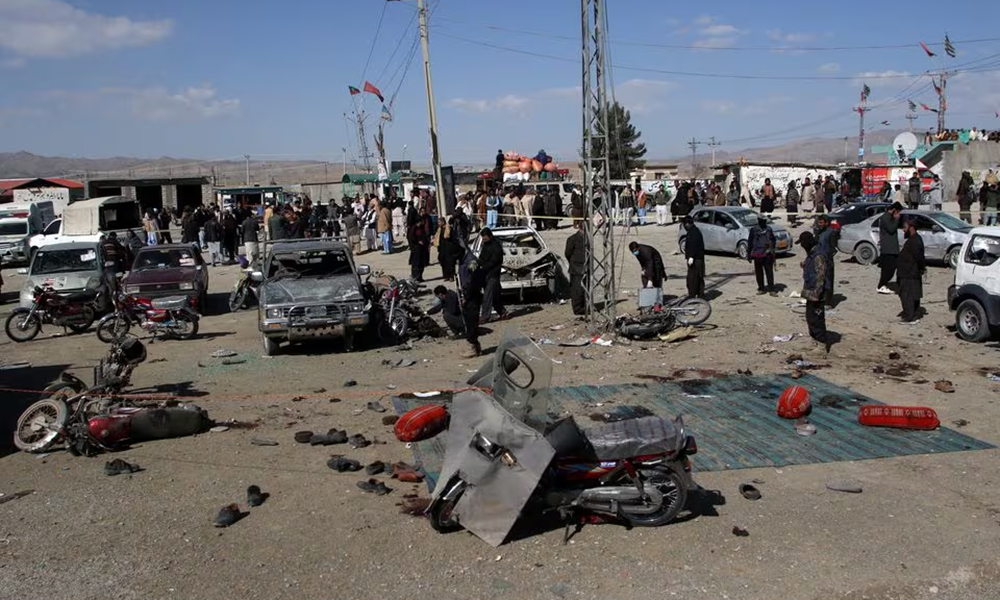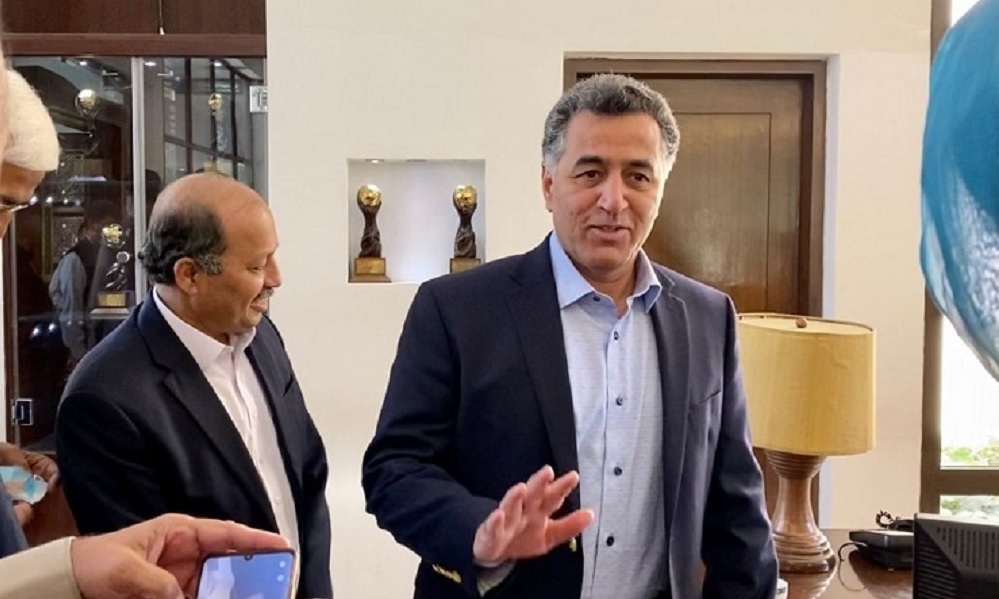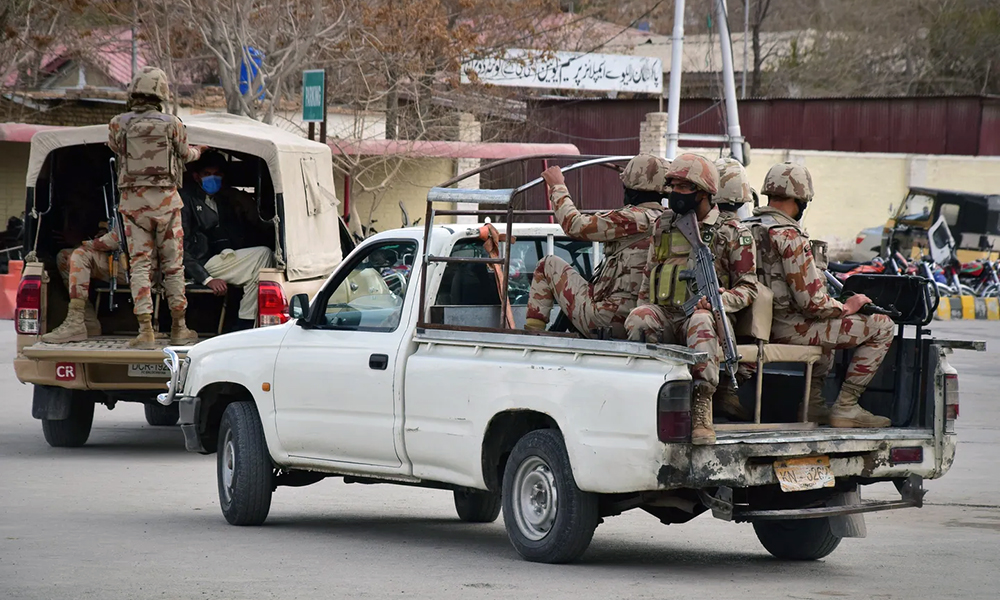Regional
Blasts near Pakistan candidates’ offices kill 26 on election eve

Two explosions near electoral candidates’ offices in Pakistan’s southwestern province of Balochistan killed 26 people and wounded dozens on Wednesday, officials said, raising concerns over security on the eve of a general election, Reuters reported.
Pakistan goes to the polls on Thursday amid rising militant attacks and the jailing of Imran Khan, the winner of the last national election, who has been dominating the headlines despite an economic crisis and other woes threatening the nuclear-armed country.
Authorities have said they are boosting security at polling booths.
The first attack, which killed 14 people, took place at the office of an independent election candidate in Pishin district.
The second explosion in Qilla Saifullah, near the Afghan border, detonated near an office of Jamiat Ulema Islam (JUI), a religious party that has previously been the target of militant attacks, according to the province’s information minister.
The deputy commissioner of Qilla Saifullah, Yasir Bazai, said that 12 people were killed and 25 wounded by a device planted on motorcycle parked near the office, read the report.
Daesh claimed responsibility for the two blasts in a message on its Telegram channel on Wednesday.
Several other groups, including the Islamist militant Pakistani Taliban (TTP) and separatist groups from Balochistan, oppose the Pakistani state and have also carried out attacks in recent months.
A TTP spokesman claimed an attack on Monday that killed 10 people at a police station in northwest Pakistan. The TTP has said it was targeting police and security officials rather than electoral candidates.
Pakistan’s foreign office said in a statement its western border crossings with Iran and Afghanistan would close and re-open on Friday to ensure security during the election, Reuters reported.
Khanzai hospital, close to the site of the explosion in Pishin on Wednesday, put the death toll at 14 and said more than two dozen were wounded. The deputy commissioner of Pishin district, Jumma Dad Khan, said that the blast had wounded many people.
“I’m appalled by today’s terrorist attacks and condemn those seeking to prevent people from voting,” British High Commissioner to Pakistan Jane Marriott said.
The attacks came as political parties wrapped up their campaigning in the quiet period mandated by electoral rules the day before the election.
Khan, in a message from jail, earlier urged his supporters to wait outside polling booths after casting their votes, as rival political parties held large rallies to mark the end of the election campaign period.
Any large-scale gathering of Khan’s supporters near booths could raise tensions because of what they call a military-backed crackdown on him and his party that has restricted campaigning. The military denies interfering in politics.
“Encourage the maximum number of people to vote, wait at the polling station … and then stay peacefully outside the Returning Officer’s office until the final results are announced,” said Khan on social media platform X, accompanied by an undated photograph depicting him wearing simple black clothing.
His Pakistan Tehreek-e-Insaf (PTI) party also released a video of Khan recorded just days before he was arrested in August, calling on people to turn out to vote.
Kasim Khan, Khan’s son with British journalist Jemima Goldsmith, in a post on X called on people to vote with an image of him and his brother holding a PTI flag. A PTI official confirmed the account belonged to Kasim Khan, a rare social media post from Imran Khan’s children who have previously stayed out of the public eye.
Electoral frontrunner Nawaz Sharif led a huge rally in the eastern city of Kasur with his brother, former Prime Minister Shehbaz Sharif, who is running in that constituency.
Amid a sea of tens of thousands of supporters waving green party flags, Sharif, also a former prime minister, called on the country’s youth to support his party and took aim at Khan who has previously attracted support from young voters in the area.
“Don’t fall for him,” Sharif said.
Supporters of the rival Pakistan People’s Party also gathered in the southern city of Larkana led by Bilawal Bhutto Zardari, who could play kingmaker if no single party receives enough parliamentary seats to form a government outright.
The former foreign minister and son of assassinated former Prime Minister Benazir Bhutto criticised opponents, including Sharif, for what he described as compromising the country’s security and economy during their tenures, Reuters reported.
Regional
Pakistan’s ex-spy chief jailed for 14 years in rare military rebuke

A military court in Pakistan jailed former spy chief Faiz Hamid for 14 years on four charges including interference in politics, the army said on Thursday, in a rare conviction of a once-powerful general in the South Asian nation.
Hamid, in custody and under trial since August last year, was the chief of Pakistan’s powerful Inter-Services Intelligence agency from 2019 to 2021 under jailed former Prime Minister Imran Khan, and the two were considered close allies.”The accused was tried on four charges,” the military said in a statement, Reuters reported.
The charges ranged from engaging in political activities and violating the Official Secrets Act in a way detrimental to safety and state interest to misuse of authority and resources as well as causing wrongful loss to individuals, it added.
TIES TO JAILED FORMER PM IMRAN KHAN
The former general was found guilty on all the charges, the military said, without detailing the incidents. His conviction followed “lengthy and laborious legal proceedings”, it added, and Hamid has a right of appeal.
He also faces a separate investigation of his role in May 2023 attacks by thousands of Khan’s supporters on scores of military installations and offices to protest against the arrest of the 72-year-old former cricket star.
Information Minister Attaullah Tarar said Hamid had crossed “red lines” and acted as an advisor to Khan’s party to try to create chaos in the country.
Hamid’s lawyers or family could not be reached for comment. Khan’s PTI party did not immediately respond to a Reuters request for comment.
Khan has been in jail since August 2023.
Khan and nearly 150 of his party leaders and supporters have already been indicted by an anti-terrorism court on charges of inciting the attacks that also targeted military headquarters in the garrison city of Rawalpindi.
Khan and his associates deny the charges.
Hamid’s close ties to Khan, who blames the military for ousting him from power in 2022, were a source of tension between the cricketer-turned-politician and the military.
The military, which has directly ruled the nation of 241 million for more than three decades of its 77-year independent history, plays a big role in making or breaking governments.
Regional
Six Pakistani soldiers killed in TTP attack in Kurram District
Islamabad has accused TTP fighters of using Afghan territory to stage attacks inside Pakistan, a claim Kabul denies, insisting that Pakistan’s security problems are internal matters.

Six Pakistani soldiers were killed and four others injured when militants attacked a security checkpoint in northwest Pakistan’s Kurram district, officials confirmed on Tuesday. The Tehreek-e-Taliban Pakistan (TTP) claimed responsibility for the assault.
The attack took place in the Manato area late Monday afternoon, according to a police officer at the district’s emergency control room. A government official, speaking on condition of anonymity, told AFP that two militants were also killed during the exchange of fire.
Security forces later identified one of the dead militants as local TTP commander Usman Khyberi.
The incident comes amid heightened tensions between Pakistan and Afghanistan, as both sides struggle to maintain a fragile calm following deadly border clashes in October—the worst since the Islamic Emirate took control of Kabul in 2021.
Sporadic skirmishes have continued, including heavy exchanges of fire last week that left at least five people dead.
Islamabad has accused TTP fighters of using Afghan territory to stage attacks inside Pakistan, a claim Kabul denies, insisting that Pakistan’s security problems are internal matters.
Efforts to broker a lasting truce have so far failed. Three rounds of peace talks—facilitated by Qatar, Türkiye, and Saudi Arabia—have not produced a breakthrough.
Regional
Putin questions US punishing India for buying Russian oil
Hours earlier, Modi received Putin at the airport in Delhi, a rare gesture underlining the warm ties between the leaders.

Russian President Vladimir Putin challenged heavy U.S. pressure on India not to buy Russian fuel if the U.S. could do so as he began a two-day state visit, where he was embraced on arrival by Indian Prime Minister Narendra Modi.
Putin spoke in comments to Indian broadcaster India Today, aired hours after landing in New Delhi for a visit during which both countries are seeking to boost mutual trade and expand the variety of items in transactions.
New Delhi and Moscow have strong ties going back to the days of the former Soviet Union, and Russia has been the main source of arms for India for decades. India has also emerged as the top buyer of seaborne Russian oil despite Western sanctions imposed after Moscow launched its invasion of Ukraine in February 2022.
India’s crude imports, however, are set to hit a three-year low this month following a punitive U.S. tariff on Indian goods and a tightening of sanctions on Russia, as U.S. President Donald Trump’s administration says India’s purchases of cheap Russian oil help finance Moscow’s war in Ukraine.
“The United States itself still buys nuclear fuel from us for its own nuclear power plants. That is also fuel,” Putin told India Today.
“If the U.S. has the right to buy our fuel, why shouldn’t India have the same privilege? This question deserves thorough examination, and we stand ready to discuss it, including with President Trump,” he said.
India has said Trump’s tariffs are unjustified and unreasonable and pointed at ongoing U.S. trade with Moscow. The U.S. and European Union continue to import billions of dollars worth of Russian energy and commodities, ranging from liquefied natural gas to enriched uranium.
“There is a certain decline in overall trade turnover during the first nine months of this year,” Putin said when asked if Indian oil purchases had fallen under pressure from the West.
“This is just a minor adjustment. Overall, our trade turnover stands almost at the same level as before.”
He added: “Trade in petroleum products and crude oil … Russian oil, is running smoothly in India.”
Asked how India and Russia should deal with Trump and his tariffs, Putin said the U.S. President has advisers who believe that implementing such tariff policies ultimately benefits the U.S. economy. “We hope that, in the end, all violations of World Trade Organization regulations will be rectified,” he said.
Hours earlier, Modi received Putin at the airport in Delhi, a rare gesture underlining the warm ties between the leaders.
They embraced on a red carpet on the tarmac and then drove away in the same vehicle for a private dinner hosted by Modi.
Senior Russian ministers and a large Russian business delegation were in New Delhi for Putin’s visit and the two leaders will hold summit talks on Friday when they are expected to announce a raft of deals.
“Delighted to welcome my friend, President Putin to India. India-Russia friendship is a time-tested one that has greatly benefited our people,” Modi posted on X ahead of the dinner.
India and Russia aim to raise two-way trade to $100 billion by 2030. Their commerce rose more than five-fold from about $13 billion in 2021 to near $69 billion in 2024–25, almost entirely driven by Indian energy imports.
Bilateral trade eased to $28.25 billion in April–August 2025, reflecting a decline in crude oil imports.
At the same time, India is looking for new destinations to increase exports of its goods hit by the punishing 50% tariff imposed by Trump.
Russia wants to import more Indian goods to balance bilateral trade, which is currently heavily skewed towards energy, Deputy Kremlin Chief of Staff Maxim Oreshkin told a business conference in New Delhi earlier on Thursday.
Indian Trade Minister Piyush Goyal said New Delhi wants to diversify exports to Russia and increase sales of automobiles, electronics goods, data-processing equipment, heavy machinery, industrial components, textiles, and foodstuffs.
-

 Latest News2 days ago
Latest News2 days agoMuttaqi: Afghanistan’s progress requires both religious and modern education
-

 Sport4 days ago
Sport4 days agoILT20: Desert Vipers edge Gulf Giants in historic super over thriller
-

 Regional4 days ago
Regional4 days agoSix Pakistani soldiers killed in TTP attack in Kurram District
-

 Business4 days ago
Business4 days agoTrade bodies warn almost 11,000 Afghan transit containers stuck at Karachi port
-

 World4 days ago
World4 days agoPowerful 7.6 earthquake hits northern Japan, tsunami warnings issued
-

 Latest News3 days ago
Latest News3 days agoTrump calls Afghanistan a ‘hellhole’ country as US expands immigration restrictions
-

 Sport3 days ago
Sport3 days agoCommanding wins for Arman FC and Sarsabz Yashlar in Afghanistan Champions League
-

 Latest News5 days ago
Latest News5 days agoPakistan’s top general calls on IEA to pick between ties with Islamabad or TTP
























